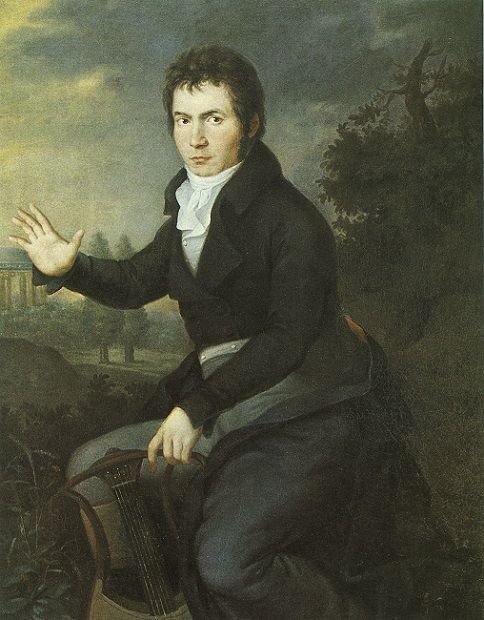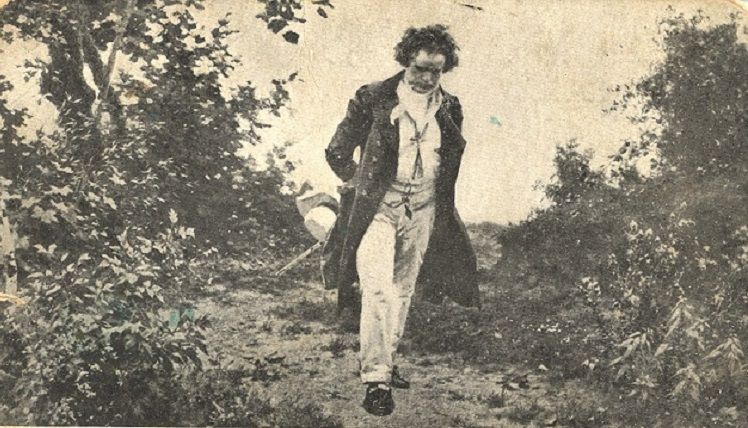Ludwig van Beethoven - Music is a higher revelation than any wisdom and philosophy
Ludwig van Beethoven is a German-classical composer, a representative of the Vienna School, an important figure in the transition period between classicism and romanticism. Considered one of the greatest composers in the history of music, he inspires many composers, musicians and listeners for generations. He lives in torment, deafness and incurable pride. He only listens to his music and conscience. When he dies, there is no close man to bend his eyes - it happens on March 26 190 years ago.

Ludwig van Beethoven was born on December 16, 1770 in Bonn. His father, Johan, is a court singer singer, but his weakness in alcohol ruins both him and his family. Her mother has always described the genius as a very good man with a generous heart, calling her "my best friend". A maid, a chef's daughter, she gives birth to seven children, but only three of them survive - Ludwig is the eldest. From the very beginning, the life of the future composer is a fierce and grim struggle. Discovering the talent of his son, his father decides to take advantage of the child's musical genius. It diffuses it everywhere and shows it as "a little miracle". From the age of four, the boy plays the harpsichord and the violin to the tune, amusing the audience, "provided" by almost always drunk Johann. His adolescence is dazzled by the care of the needy and the need to earn the livelihood of the family. At 11 he already plays in the orchestra, 13 is a respected organist. In 1787 his mother died, which the youth adored. At the age of 17, Ludwig became the head of the family, and on his shoulders, he cared for the upbringing of his two brothers, as their father is falling more and more. His miserable pension gives his son not to drink it. During these troubled years, Beethoven finds support in a Bonn family, Brening, who will remain forever close to the composer. Eleonora Breeding is 2 years less than him. He introduces it into the world of music, it is in that of poetry. His companion is in his childhood, and it is possible that both have experienced one another and more special feelings ... Eleanor then marries Dr. Vegeler, who becomes one of Beethoven's best friends. As hard as Ludwig's childhood is, he keeps forever a gentle memory of him and the places where he grew up. On May 14, 1789, Beethoven enrolled at the University of Bonn. And it is then that the revolution broke out, which sparsely spread across Europe, conquering the young man's heart. In November 1792, Ludwig left Bonn, the moment the war broke out in his native town. He intends to set up in Vienna. At that time, the genius musician affirmed his republican beliefs.
It appears to be extremely proud, sharp and gloomy. He speaks with a pronounced provincial accent. But his close friends know how much good is hidden behind his rough, cumbersome manners. In 1796 something terrible is happening - the composer's life gradually but forever sinks into silence. At night there is an unbearable noise in his ears, severe pains in his stomach, his hearing slightly weaker. For several years, Ludwig did not admit his tragedy to anyone, he avoided communicating even with his best friends - so as not to be aware of the distress that had happened to him. He kept his terrible secret until 1801 when he did not endorse and tell everything to Dr. Vegeler and Pastor Alfred Ammena.

The sufferings are also aggravated by the peculiarities of the character of the genius. He is famous for his infatuation, he is constantly in control of his insane feelings, he sinks into dreams of happiness, and then he is quickly disappointed, experiencing his deep sorrow. In 1801, he is obsessed with his passion for Juliet Guycardi, who immorts by dedicating her famous Moon Sonata. It was then that Beethoven wrote to his friend Dr. Vegeler: "... She loves me and I love her. The first happy minutes in my life for the past two years! " But Ludwig pays dearly for them. Above all, this love makes Beethoven even more painful to feel his misfortune and how fragile he really is - the chance to marry his beloved is absurd. Besides, Juliet is coquettish - ankle and selfish. It causes Beethoven severe suffering, and in November 1803 she marries Count Gallenberg. She is not afraid to take advantage of her past love with Beethoven to please her husband. Such passions devastate the soul, and when she is already hurt by a monstrous handicap, as with Beethoven, a person completely collapses. In that period of his life, the composer is on the brink of physical and spiritual survival. He experiences days of terrible despair, but at the same time he longs for happiness. He does not want to admit that his unhappiness is irreversible: he longs for healing and love filled with the brightest hopes.
Soon love and happiness go back to him
In May 1806 he became engaged to Theresa von Brunswick, Juliet's cousin. She has long been in love with Ludwig since the time she took piano lessons as a little girl - at the composer's first residence in Vienna. Beethoven is a friend with her brother, Count Franz. In 1806 he visited his family in Hungary, where their mature love with Therese flashed. But some mysterious reason for which history is silent hampers the development of their relationship. Perhaps it is a shortage of funds or a difference in the social situation. And it is likely that Beethoven is rebellious, offended, that makes him wait too long. Whatever happened, the engagement is spoiled, but neither the composer nor the young Countess succeed in forgetting their love. By the end of her days (and she died in 1861) Theresa loves Beethoven. In 1816, the composer shared: "When I remember her, my heart began to beat with the same power as when I first saw it."

Therese gives Ludwig a portrait with his dedication: "The rare genius, great artist and good man. TB ". In the last year of his life, Beethoven's friend accidentally sees him holding the portrait in his hands, weeping and kissing him, speaking out loud, "You were so wonderful, so generous, a real angel!" So, love goes away from him. In 1810 he remained alone, but the glory came, and with her the consciousness that he was powerful. He is in the heyday of his powers and gives his will to his unbearable temper - without having to take care of anybody or to comply with the conventions and the opinion of the others. Soon he ceases to look after his appearance, and his manners become especially daring. 1814th is the year of the peak of Beethoven's glory. At the Vienna Congress he met him as a European celebrity. He takes active part in celebrations, the crowned people witness their respect for him, and he proudly accepts their applauses. After the swirling glory, however, the most sad, the most profound year of the life of the genius comes. Beethoven never loves Vienna and takes every opportunity to leave her. In 1808, he almost decided to leave Austria, but three of the richest heroes of the Austro-Hungarian Empire - Archbishop Rudolf (pupil of Beethoven), Prince Lobkowitz and Prince Kinski - offered him to pay him an annual pension of four thousand florins with the only condition to remain in Austria.
Unfortunately, the engagement of the aristocrats practically remains on paper only. The money is paid in bad faith, and it is not long after that they are completely discontinued. After the congress in 1814, which aims to redraw the political map of Europe and balance the forces to avoid future wars and revolutions, Vienna itself is changing unrecognizably. Politics shifts public attention from art, musical taste is "political," fashion is dictated by Rossini, and Beethoven is named pedant. His friends and patrons are scattered, and some die. Here's Ludwig again alone. Totally deaf, since early 1815 he has been communicating with only a few of his relatives with letters. Detached completely by people, he finds comfort in nature: every day he walks around the city, wanders around the countryside alone - naked and in the heat, and in the rain. Trouble is starting to suffer - it is not uncommon when he does not leave his home because ... there is no healthy pair of shoes. He has accumulated large debts to publishers, and his works are not profitable. He gets the most 30-40 dwarves for his amazing sonatas, each costing him three months of work.

In addition to the cash problems of Beethoven's head, another burden is burdened - his mentor Karl, the son of his brother who died of tuberculosis in 1815. Though his uncle is deeply attached to him, the youth is unworthy of his plans and hopes. Beethoven dreams of doing everything for the boy - who is otherwise not deprived of his abilities - to provide him with a future. He intends to give Karl a university education, but he has to settle for the fact that the young man prefers trade and chooses to deal with it. Even worse - he hangs over the gambling halls and raises debts. It is enough that in the summer of 1826 he even tries to commit suicide, but he is alive. Then, after the incident, Beethoven almost died, and he did not manage to get out of the dreadful shock he was in. Karl heals and continues to harass his uncle, whose death is partly to blame. The music written during these last years of the composer's life acquires a completely new tinge of irony; it often sounds like a heroic and jubilant mood. Beethoven does not believe in death. And she inexorably approached him. At the end of November 1826, the composer froze and suffers from pleurisy. Returning from one of his journeys to Vienna (again to make up for his nephew's mess), he completely collapses. His friends are far away. He asks Carl to call a doctor, but the young scoundrel "forgets" about his uncle's charge and goes back in a few days. The doctor appears too late, and his treatment is obviously not the best for the case.
For three months, Ludwig's body struggles with the disease. But on January 3, 1827, the composer wrote a will, making his "beloved" nephew his only successor. The last minutes of life of genius would be humiliating if it was not the generous help of his English friends. Beethoven becomes absent for him, very gentle and patient. On the deathbed, after three operations in anticipation of the fourth, on February 17, 1827, he wrote with complete peace of mind: "I am charging with patience, and I think any misfortune brings us some good." The "blessing" for Ludwig van Beethoven is the deliverance, the "end of the comedy," as he himself slammed, drowning. And the generations would say, "the end of the tragedy of the life of a genius." He died on March 26, 1827, during a terrible snow storm - scorched by monster thunder and lightning. There is no close man next to him who can clutter his eyes ...